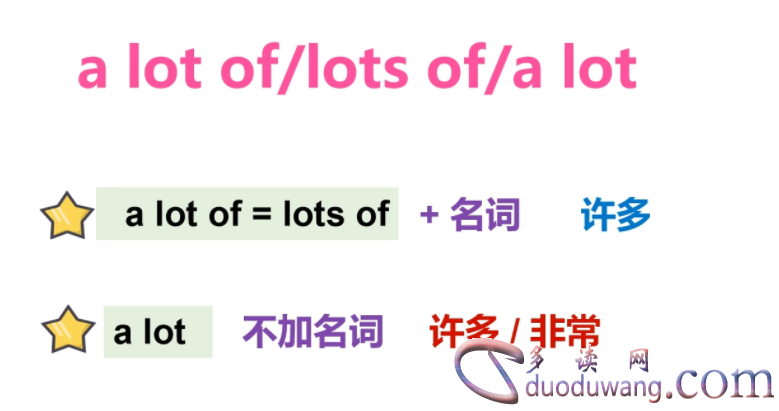在英语中,我们经常会遇到“alotof”和“many”这两个词,它们都表示“许多”的意思。然而,它们之间有着微妙的区别。本文将详细探讨“alotof”和“many”的区别和用法。
定义和用法
1.1 “a lot of”
“a lot of”是英语中常用的短语,用来表示“许多”或“大量的”。它可以修饰名词,形容词或副词,并且常常用于疑问句、否定句或肯定句。
例如:
- There are a lot of books on the shelf.(书架上有很多书。)
- She has a lot of friends.(她有很多朋友。)
- He doesn't have a lot of money.(他没有很多钱。)

1.2 “many”
“many”是一个形容词,用来表示“许多”或“很多”。它通常用来修饰可数名词的复数形式,并且常常用于疑问句、否定句或肯定句。
例如:
- How many books are on the shelf?(书架上有多少本书?)
- She doesn't have many friends.(她没有很多朋友。)
- There are many people in the park.(公园里有很多人。)

数量
2.1 “a lot of”
“a lot of”表示数量时,强调的是大量的多,但不具体指出具体数量。它可用于可数名词和不可数名词,使语句更加灵活。
例如:
- She has a lot of experience.(她有很多经验。)
- There are a lot of apples in the basket.(篮子里有很多苹果。)
2.2 “many”
“many”表示数量时,强调的是可数名词的数量,且具体指明数量的多少,不适用于不可数名词。它更为正式和精确。
例如:
- How many apples are in the basket?(篮子里有多少个苹果?)
- There aren't many books on the shelf.(书架上没有多少本书。)

具体情景
3.1 “a lot of”
“a lot of”在口语和非正式场合中更常见。通常用于描述一大堆事物、抽象概念或泛指的场合。
例如:
- I have a lot of homework to do.(我有很多作业要做。)
- They have a lot of problems to solve.(他们有很多问题要解决。)
3.2 “many”
“many”更常用于正式场合,例如学术论文或书面语,以及需要更精确描述数量的情景。
例如:
- In the experiment, many variables were considered.(在实验中,考虑了许多变量。)
- Many people attended the conference.(很多人参加了会议。)
总结:
总结:尽管“a lot of”和“many”都表示“许多”的意思,但在使用上有一些微妙的区别。“a lot of”更加通用,可用于可数名词和不可数名词,并在口语和非正式场合中使用。“many”更加正式,仅适用于可数名词的复数形式,并在正式场合中更为常见。根据具体的语境和需要,我们可以灵活运用这两个词来表达“许多”的含义。